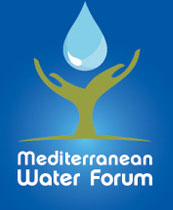 Mediterranean cross-continental process
Mediterranean cross-continental process
The eight Mediterranean Target Objectives are organized around 4 priorities as follow: Download the full programme
1. Improving water demand management
- Med 1.1- By 2015, each Mediterranean country has set its own national objectives for water use efficiency in the various using sectors and for water allocation between the different uses (productive and environmental) and defined/implemented "efficiency plans" for achieving their short-, medium- and long-term objectives.
- Med 1.2- By 2015/2020, Mediterranean country has set its own national objectives for improving the water productivity of rainfed and irrigated agriculture, in the framework of an integrated water and food-security strategy, and defined/implemented measures for achieving their objectives in the short, medium and long term.
2. Use of non-conventional resources
- Med 2.1- By 2015, to ensure that national water resources planning in all Mediterranean countries includes the contribution of non-conventional resources within the global water resources systems models and analysis. This planning should take into account the related possible effects on the environment, economy, health and energy
- Med 2.2- By 2015 to develop a common regulatory framework for the Mediterranean area that considers the specific hydroclimatics features of the region, with its singular problems of scarcity and droughts in semiarid environments. This framework must integrate the contribution of non-conventional resources with the rest of supply and demand, structural and non structural alternatives.
- Med 3.1- In the medium term (by 2020), every Mediterranean country - supported by multi-stakeholder national dialogues and in view of achieving cross-sectoral water resources management - has in place operational and applicable national IWRM Plans and Water Efficiency Strategies and has developed and/or substantially advanced river basin management plans, all of which are linked/align with National Development Strategies, National and/or Sectoral Financing Strategies, National Adaptation Plans and, where applicable, National Integrated Coastal Zone Management Plans and International Agreements regarding the protection of transboundary water bodies.
- Med 3.2- In the medium term (by 2020), every Mediterranean country has activated and operationally implemented mechanisms for effective stakeholder participation throughout the different components of basin water resources management and has in place a functioning articulation between central and decentralised levels.
4. Urban and Industrial Wastewater collection and treatment
- Med 4.1- By 2020, every Mediterranean country has put into force a rule supervising the discharge of industrial waste in the collective sanitation systems, and by specifying the technical, financial and monitoring modalities.
- Med 4.2- By 2020, each Mediterranean country has defined a strategy of sustainable cost recovery (SCR) for sanitation services through the use of tariffs and fees, public subsidies and international financial assistance to ensure economical sustainability, equitable access for all and pollution control. Thematic: Tariffs, Taxes and Transfers (the "3Ts")
--
|
MEDITERRANEAN CROSS CONTINENTAL PROCESS 8 thematic sessions organised on: 13, 14 & 15 March 2012 |
**************************************************************************************************************
************************************************************************************************************** |
Mediterranean Cross-Continental Coordinator
Hachmi Kennou
Mediterranean Water Institute (IME)
ime-eau.org
 you are not logged in
you are not logged in








